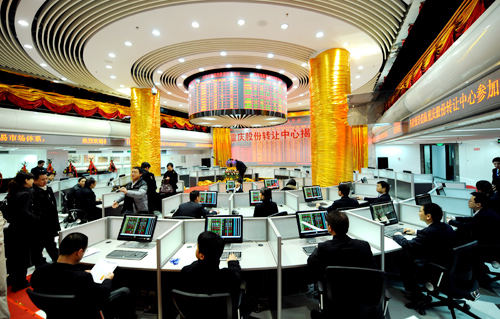|
 |
|
NEW PLATFORM: The Chongqing Financial Assets Exchange, established on December 27, 2009, in southwest China's Chongqing Municipality provides services for venture capital and private equity investments (ZHOU HENGYI) |
If a falling brick hits 10 people in Beijing's Financial Street, nine of them would be engaged in private equity. This quirky comment about China's venture capital and private equity industry has been circulating as the sector enjoys a golden age, even as bubbles form across China.
By the end of 2010, China had 632 registered venture capital and private equity firms, an increase of 32 percent compared with the previous year. Their capital hit a record high of 150 billion yuan ($23.3 billion), a year-on-year increase of 54.3 percent, said a report released by the Investment Association of China.
All the while, bubbles are forming.
"Many unqualified companies joined the industry and broke the market rules by offering unreasonably high prices," said Chen Zhiwu, a financial economics professor at Yale University's School of Management.
Chen warned that China's economy is undergoing structural adjustments, which may pose high risks to the private investment sector.
The legendary business
Venture capitalists have found themselves atop of mountain of gold in China. High investment return records are being set and broken at jaw-dropping speeds.
Take International Data Group (IDG), one of the earliest foreign investment funds in China, for example. Patrick McGovern, founder and Chairman of IDG, said the return rate of venture capital is 10-20 percent in Europe, 25-35 percent in the United States, and 35-45 percent in China.
IDG has invested in more than 200 companies in China, such as Ctrip, Home Inns, Baidu, Tencent, Sohu and Vancl, and has successfully left 50 investments through mergers and acquisitions or IPOs in the United States, Hong Kong and China.
In 1999, IDG invested $1 million in Soufun, a real estate website. Its investment return increased 45-fold in 2005. In 2000, IDG invested $1 million in Baidu, China's largest search engine, and its share valued at $100 million by the time Baidu was listed on the Nasdaq in 2005.
The launch of China's growth enterprise board ChiNext at the Shenzhen Stock Exchange in October 2009 led to a proliferation of rags-to-riches tales and unimaginable earnings.
"To some extent, venture capitalists and private investors are the biggest beneficiaries of ChiNext," said Liu Zhou, President of Shenzhen Fortune Venture Capital Co. Ltd.
About 59 percent of companies listed on ChiNext were backed by venture capital or private equity firms in the first year after its launch, compared with 35 percent of stocks traded on China's board for small and medium-sized enterprises (SME) in Shenzhen, said ChinaVenture Group, the country's leading investment consulting firm.
| 